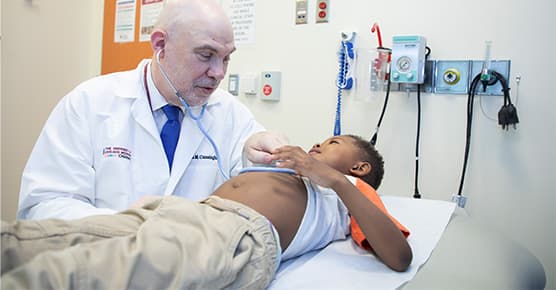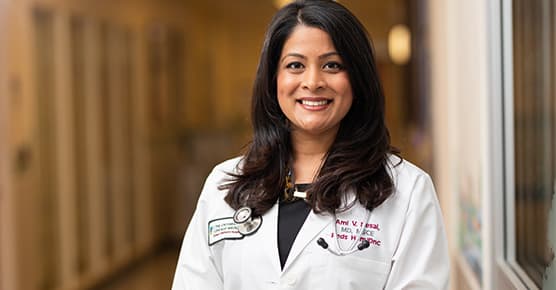Adolescent & Young Adult Oncology Services for Leukemia Patients
[MUSIC PLAYING]
I was 18 when I was diagnosed.
[MUSIC PLAYING]
I was just not feeling well because it was, like, the Christmas season and I had finals. And when you work retail, it's such a rush. And you're just thinking, oh, I just don't feel good because I'm working extra hours. And then I just didn't get better, and I didn't get better.
Then, I was at work and I fainted. That was a sign that I needed to go to the doctor, that I needed help. There was something wrong with me at that point.
[MUSIC PLAYING]
It was a real shock when we got the diagnosis of cancer. I don't think anybody ever expects that, especially with your children. It's so painful. And we -- I knew that our whole life was going to be changed by it.
[MUSIC PLAYING]
They started the treatments immediately. So there was no delay. He strongly recommended Comer Children's Hospital. He said, “If it was my kid, that's where I'd take her.”
We got our appointment right away, went in and met Dr. McNeer -- wonderful, wonderful woman and great doctor. She saved Rachael's life. I know she did.
[MUSIC PLAYING]
Rachel was diagnosed with acute lymphoblastic leukemia, or ALL. And this is a leukemia that we see very often in pediatrics. It becomes less common in patients as they get into adulthood. But we have learned that young adults with ALL have better survival outcomes when treated with pediatric protocols. And so by referring Rachael to our adolescent and young adult oncology program, we were able to treat Rachael on one of these pediatric protocols and give her the best chance of cure.
Rachael was great. She was very positive the whole time and never complained at all about anything we asked her to do.
The following eight or nine months was pretty heavy chemotherapy regime where I lost all of my hair. And I was sick. I was in and out of the hospital a lot.
[MUSIC PLAYING]
I just tried to remember that, you know, it's not the time -- it's not what you're given, it's what you do with the time that you're given. It's not about how many years you get, but what you do with your years is really what's important. And just trying to stay positive and to the fact that even if you don't get better, it's still a -- it's still a way to look at life in a way that most people don't get a perspective on.
[MUSIC PLAYING]
Rachael is a beautiful person. And I think she found a lot of strength in poetry and reading. Rachael has been in remission for several years. She's cured of her leukemia.
It's not something I would wish on anyone, but at the same time, I would never take it back. It's been -- it's made me who I am.
[MUSIC PLAYING]
At the University of Chicago Medicine Comer Children's Hospital, we understand teens and young adults have unique personal, emotional and medical challenges when facing a cancer diagnosis. Through our Adolescent and Young Adult (AYA) Oncology Program, our goal is enable these patients to take an active role in their care and feel engaged during every step of their health care journey.
Why a Special Program for Adolescents & Young Adults?
Teens and young adults facing a cancer diagnosis have unique medical, emotional and psychosocial needs. Like their peers, they are concerned about their social life, dating, school and their future. We help them manage the cancer journey while still moving forward in their lives.
What is Different About Cancer Treatment for this Age Group?
A landmark 2008 study by UChicago Medicine researchers found that survival rates of young adults, ages 16 to 20, with acute lymphoblastic leukemia (ALL) were significantly higher with a pediatric treatment regimen, which is more intensive than the approach used for adults with ALL. This research led to changes in cancer treatment for AYA patients across the U.S. The unique biology of these cancers allows treating physicians to tailor therapy as much as possible for specific patients.
How Else Does the AYA Program Support Young People with Cancer?
We assist them in navigating the health care system and in providing them the autonomy to take an active role in their care. We partner with psychologists, social workers, and an AYA program coordinator to ensure patients have access to the support networks they need to navigate their cancer treatment at such a formative time. Most young cancer survivors require lifelong monitoring for long-term effects of treatment, so it’s important for patients to be actively involved in their care from the beginning.



